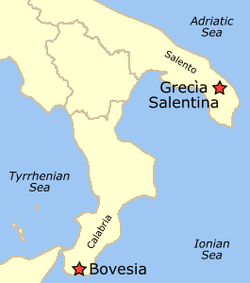Италиянь грекень ломанть

Италиянь грекень ломанть – раськень вейсэньдявкс кона эри Италия Масторсо, Калабриясо ды Апулеясо. Сон кортыть сонзэнь кельсэ (Грико кель) ды улить сонзэ культуранть[1].
Васенце грекень куншкань таркат лисемсть Италиясо антикань пингезэ (пря лопа - Покш Греция) ды куншкапингезэ (Византиянь азорксчи лембеёнксонь Италиянть). Те группатне молемсть Италияв Балкансто ды Вишка Азиясто славянонь, булгаронь, арабонь ды турконь экспенсиянтне кувалт. Меельце группа чилисемасто молемсь Италияв XV пингезэ, Константинополень кулозь мейле. Сынь теевсь седе покш раськень колониянть Венециясо ды Римсо.
Течи улить кавто раськень группатне кортамсть грикокс: "Bovesia" ды "Grecia Salentina"[2].
Лембеёнксонь Италиясо италиянь диалекттнэ ульнесть седе покш кастомсть ансяк XIII-XV пингезэтне Византия империянь политикань ды культурань влияниянь маштоманть кувалт. Тосо ульнесь кавксо-келень пинге, кона ютамсь XVII пингезэ[3].
XIX пингень ушодксо ульнесть малав кемгавтомо буетне кортамс грекень кельсэ, ды ансяк сисем буетне ульнесть те пингень песэ (малав 8 тёжат кортыцят).
Течи улить кавто раськень группатне конатнесэ эри италиянь-грекень культурась: (Калбариясо вакссо Режия ди Калабрия) ды Греция Салентина (Апулиясо вакссо Лечче)[4].
Эрьва буесь ули зярояк велетне. XX пингень песэ грекень кортыцянь ламочи Бовесиясо ульнесь малав 3,9 тёжат ломанть. Специалисттнэ лемды пря тувтал киремеманень ассимиляцись ды эмиграциясь Пелевеёнксонь Италиясто[5][6].
1999 иестэ италиянь кирдимастор кортысь италиянь-грекень раськень группанть ули 20 тёжат ломанень ламочи.
Сонзэ эрий келесь ули грико кель.
Италиянь грекень ломанть улить седе покш византиянь традициянь католикттне, кортамс латинэкс литургияв.
Литературась
[витнемс | витнемс лисьмапрянть]Англакс
- Jonathan Harris, 'Being a Byzantine after Byzantium: Hellenic Identity in Renaissance Italy', Kambos: Cambridge Papers in Modern Greek 8 (2000), 25-44
- Jonathan Harris, Greek Emigres in the West, 1400–1520 (Camberley, 1995)
- Jonathan Harris and Heleni Porphyriou, 'The Greek diaspora: Italian port cities and London, c. 1400–1700', in Cities and Cultural Transfer in Europe: 1400–1700, ed. Donatella Calabi and Stephen Turk Christensen (Cambridge, 2007), pp. 65–86
- Heleni Porphyriou, 'La presenza greca in Italia tra cinque e seicento: Roma e Venezia', La città italiana e I luoghi degli stranieri XIV-XVIII secolo, ed. Donatella Calabi and Paolo Lanaro (Rome, 1998), pp. 21–38
- M.F. Tiepolo and E. Tonetti, I Greci a Venezia. Atti del convegno internazionale di studio, Venezia, 5-8 Novembre 1998 (Venice, 2002), pp. 185–95
Невтевкст
[витнемс | витнемс лисьмапрянть]Англакс
- Grika milume! Архивировазь 28 Умарьковонь 2005 иестэ. An online Griko community
- Enosi Griko, Coordination of Grecìa Salentina Associations
- Grecìa Salentina Архивировазь 24 Эйзюрковонь 2005 иестэ. official site (in Italian)
- Salento Griko (in Italian)
- English-Griko dictionary
Лисьмапрят
[витнемс лисьмапрянть]- ↑ PARDO-DE-SANTAYANA, MANUEL; Pieroni, Andrea; Puri, Rajindra K. (2010). Ethnobotany in the new Europe: people, health and wild plant resources. Berghahn Books. pp. 173–174. ISBN 978-1-84545-456-2.
ISBN 1-84545-456-1" "The ethnic Greek minorities living in southern Italy today exemplify the establishment of independent and permanent colonial settlements of Greeks in history.
- ↑ Archive copy(недоступная ссылка — история). Ваннозь 28 Эйзюрковонь 2020. Архивировано из первоисточника 5 Умарьковонь 2012.
- ↑ Archive copy(недоступная ссылка — история). Ваннозь 28 Эйзюрковонь 2020. Архивировано из первоисточника 3 Эйзюрковонь 2016. Архивировазь 3 Эйзюрковонь 2016 иестэ.
- ↑ Bekerman Zvi; Kopelowitz, Ezra (2008). Cultural education-- cultural sustainability: minority, diaspora, indigenous, and ethno-religious groups in multicultural societies. Routledge. p. 390. ISBN 978-0-8058-5724-5.
ISBN 0-8058-5724-9" "Griko Milume - This reaction was even more pronounced in the southern Italian communities of Greek origins. There are two distinct clusters, in Puglia and Calabria, which have managed to preserve their language, Griko or Grecanico, all through the historical events that have shaped Italy. While being Italian citizens, they are actually aware of their Greek roots and again the defense of their language is the key to their identity
- ↑ Pounds, Norman John Greville (1976). An historical geography of Europe, 450 B.C.-A.D.1330. CUP Archive. p. 251. ISBN 978-0-521-29126-2.
ISBN 0-521-29126-7" "Greeks had also settled in southern Italy and Sicily which retained until Norman conquest a tenuous link with Constantinople. At the time of Norman invasion, the Greeks were a very important minority, and their monasteries provided the institutional basis for the preservation of Greek culture. The Normans, however, restored the balance and permitted Latin culture to re-assert itself. By 1100 the Greeks were largely assimilated and only a few colonies remained in eastern Sicily and Calabria; even here Greek lived alongside and intermarried with Latin, and the Greek colonies were evidently declining.
- ↑ "Hellenic Republic Ministry of Foreign Affairs, Italy, The Greek Community".
Greek community. The Greek diaspora consists of some 30,000 people, most of whom are to be found in Central Italy. There has also been an age-old presence of Italian nationals of Greek descent, who speak the Greco dialect peculiar to the Magna Graecia region. This dialect can be traced historically back to the era of Byzantine rule, but even as far back as classical antiquity.